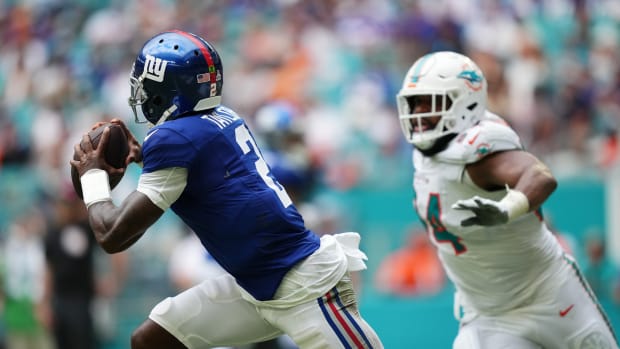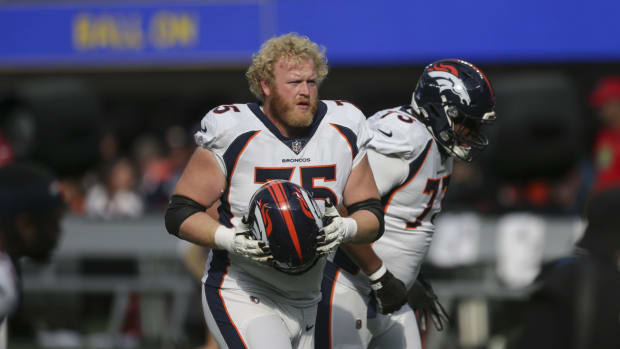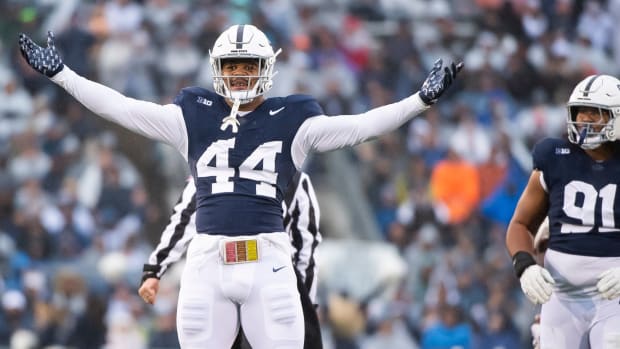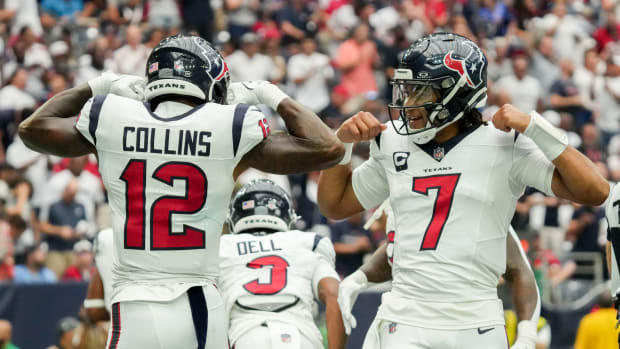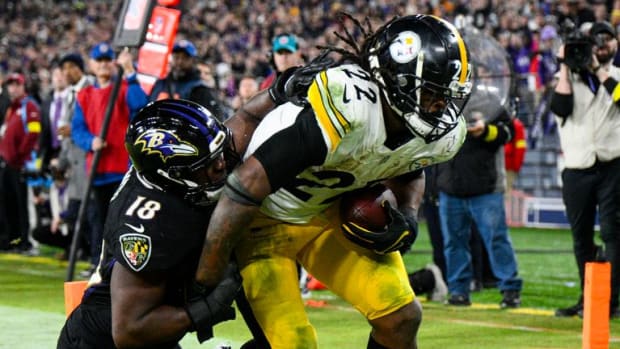The Power Of Peyton's Choice
If Peyton Manning hadn’t chosen Denver in March 2012, Pat Bowlen (left) and John Elway still might be searching for the right quarterback to lead their team. (Joe Amon/Getty Images)
Almost two years after LeBron James' free agency captivated the NBA, there was the NFL’s version involving Peyton Manning. Although Manning’s decision to play for the Denver Broncos was far less dramatic (or ridiculed) than LeBron James taking his talents to South Beach, both choices had landscape-changing impacts on their sport.
With the possible exception of the NFL’s first true free agent, Reggie White, there has not been a player like Peyton Manning available as a free agent in the history of the league. Teams have been proactive in extending their top players, especially franchise quarterbacks, long before the possibility of free agency. For instance, when I was in Green Bay, I would make sure Brett Favre’s contract always had at least two years remaining; the Packers have continued that proactive stance with Aaron Rodgers.
On Sunday, Manning returns to play the Colts in Indianapolis, where he was the signature player for 14 years before he was released. Now 18 months removed from his unprecedented free agency, it is interesting to review the teams that showed interest—publicly or privately—and examine how Manning’s choice shifted the quarterback landscape in the NFL with aftershocks that still reverberate today.
Let's start with the two teams most impacted:
If Indy kept Manning, Andrew Luck would be the new face of another franchise. (Jonathan Moore/Getty Images)
Indianapolis Colts
Manning did not play in 2011—when he made $26.4 million—due to multiple neck surgeries. Largely due to Manning’s absence, the Colts finished with the NFL’s worst record and top pick in the 2012 draft. His contract included a decision point for the Colts in the offseason: a $28 million bonus due prior to the league trading and free agency period.
The Colts' loss to the Jacksonville Jaguars in the final game of the 2011 season was the most important loss in franchise history. It saved the organization tens of millions of dollars and secured a seamless transition from one franchise quarterback to another, the rarest of NFL organizational windfalls. Had the Colts won that game and drafted in, say, the third position, it would have been very thorny to release Manning and tell their fan base they were cutting Manning for a player at another position. As luck would have it, they did not have to face that choice.
Andrew Luck would have likely been the top pick in the 2011 draft, ahead of Cam Newton, had he decided to leave Stanford early. Rather, he opted for another year in Palo Alto (as a Stanford grad, I can’t blame him). Luck’s deferral until 2012 allowed the Colts a grooved path to a truly rare player and person.
What if Manning had not been released: The Colts would have paid Manning $35.5 million in 2012 to continue his five-year, $90 million contract. (By contrast, Luck is making $21 million total over four years.) They also would have likely retained some of the many veterans shipped out along with Manning. Andrew Luck would be the present and future star of another franchise and the Colts would be continuing their search for Manning’s eventual replacement.
If Manning didn't pick the Broncos, the mania surrounding Tim Tebow in Denver might never have subsided ... and he probably wouldn't have been a New York Jet. (Hyoung Chang/Getty Images)
Denver Broncos
Manning was attracted to the Broncos for four reasons:
- Denver was ready to win immediately in a weak division
- The offense already had an elite left tackle in Ryan Clady
- The presence of John Fox, an experienced and relaxed coach
- The presence of John Elway, someone with gravitas and shared experience to counsel Manning
Tim Tebow was put up for sale the moment Manning committed; distraction removed.
What if Manning had not signed with the Broncos:Tebow would have continued to receive faint praise from Broncos management until a replacement could be found through trade, free agency or the draft.
If Manning landed in Miami, Ryan Tannehill would be an up-and-coming quarterback for a different NFL team. (Marc Serota/Getty Images)
Miami Dolphins
Owner Steven Ross has never been shy to make bold acquisitions—whether players or minority owners—in the face of a crowded entertainment marketplace in Miami. Having just hired skilled incoming offensive minds Joe Philbin and Mike Sherman, the team took an unsuccessful pass at Manning. When spurned, they brought in Alex Smith for a visit before he re-upped with San Francisco (following the 49ers' dalliance with Manning) and lost out on Matt Flynn to the Seahawks.
What if Manning had signed with the Dolphins: Although a young quarterback still might have been drafted, it is doubtful the No. 8 overall pick would have spent on Ryan Tannehill. Also, with tens of millions allocated to Manning, the free agent spending spree in 2013—Mike Wallace, Dannell Ellerbe, Phillip Wheeler, etc.—might have been tempered.
New York Jets
Not surprisingly, the Jets, who traded for Brett Favre in 2008 and moved up in the draft to take Mark Sanchez in 2009, reached out to Manning. After brief discussions never progressed, the Jets extended Sanchez’s contract, fully guaranteeing 2012 and 2013 with added years through 2016. The Jets then acquired Tim Tebow, available upon Denver’s signing on Manning. Tebow replaced newly acquired backup quarterback Drew Stanton, who was allowed to keep his $500,000 bonus and was traded to the Colts to—stay with me here—back up Luck, who replaced Manning, who replaced Tebow, who replaced Stanton.
What if Manning had signed with the Jets:Sanchez would not have been extended or guaranteed, Tebow would have never gone through a circus year in New York and there might not have been new management in place to draft Geno Smith in 2013.
Arizona Cardinals
Despite having traded for and significantly rewarded Kevin Kolb in 2011, the Cardinals coveted Manning. And Manning had reciprocal interest, making one of his few visits in Phoenix. In the end, the Cardinals held off paying Kolb his scheduled $7 million option bonus as long as they could, grudgingly doing so after Manning’s rejection.
What if Manning had signed with the Cardinals: Kolb would have been released; Carson Palmer would not have been acquired in 2013 and Larry Fitzgerald would be walking around with a perpetual smile on his face.
Philadelphia Eagles
Andy Reid could not resist at least a conversation about Manning—saying at the time “We look into everything”—despite having signed Michael Vick to a prominent contract the year before. Knowing Andy, it would have been a shock had he not at least inquired about Manning.
What if Manning had signed with the Eagles:Vick had $12 million in guaranteed salary last year so he would have been a highly expensive backup or moved in a trade, certainly playing elsewhere by 2013. Reid likely would still be in Philadelphia and Chip Kelly would still be at Oregon. Or perhaps Cleveland?
If Manning picked San Francisco, Jim Harbaugh never would have given the ball to Colin Kaepernick. (David Seeling/AP)
San Francisco 49ers
Although coach Jim Harbaugh denied it, the 49ers surreptitiously were recruiting Manning. They reportedly worked him out and gave him a physical, all while slow-playing their own free agent quarterback, Alex Smith. Smith knew it—he and Manning share an agent—and kept his options open with a visit to the Dolphins before making up with the 49ers (to the tune of $8 million guaranteed) after Manning’s decision.
What if Manning had signed with the 49ers:Smith would have moved on and would now perhaps be leading the Dolphins instead of the Chiefs. Colin Kaepernick would be a promising backup to Manning, perhaps dangled by now in a trade.
Seattle Seahawks
Owner Paul Allen reportedly sent his private plane to an airport in Denver in a failed attempt to meet with Manning to recruit him to the Pacific Northwest. One can only wonder what one of the world’s richest men would have paid Manning, even with a salary cap.
What if Manning had signed with the Seahawks: The one-year, $8 million for Matt Flynn would not have happened. The Seahawks still might have drafted Russell Wilson in the third round, and he would have been following Manning around like a puppy dog these past two seasons.
Kansas City Chiefs
Poised to enter the 2012 season with Matt Cassel and Brady Quinn at quarterback, the Chiefs reached out to Manning, with owner Clark Hunt expressing his admiration publicly. The interest, however, never seemed mutual, and the Chiefs were not a player in the Manning sweepstakes.
What if Manning had signed with the Chiefs: Cassel and Quinn would have been sent away in 2012 rather than 2013. Romeo Crennel and Scott Pioli likely would still be Chiefs; Andy Reid, John Dorsey and Alex Smith would not.
Tennessee Titans
Starts With Luck
This weekend's Broncos-Colts game will feature the NFL's two best quarterbacks this season. Yup, Andrew Luck is already that good, Andy Benoit writes.
Owner Bud Adams was so enamored by the possibility of bringing Manning back to the home state of Manning’s wife and place of Manning’s college glory that he floated the possibility of partial team ownership. Although not clear if NFL rules would have allowed it, the Titans certainly would have paid Manning significantly more than he is receiving in Denver. The Titans were so consumed with Manning that they had to back off top defensive target Mario Williams—allowing him to sign with Buffalo—and sign Kamerion Wimbley instead. Manning’s rejection is another example of debunking a myth about professional athletes wanting to play in their former "home" region; in truth it is more a distraction—family and friends wanting time, tickets, etc.—than a positive.
What if Manning had signed with the Titans:Teammates might have one of their owners playing quarterback. Matt Hasselbeck would have been jettisoned while Jake Locker, their presumed quarterback of the future when drafted 10th overall in 2010, would now be in his second year as Manning's understudy.
Washington Redskins
Despite more prudence in recent years, it would have been hard to hold back Dan Snyder were a bidding war to have developed for Manning. What could have likely been a record-breaking contract never materialized, however, as Washington never made Manning’s short list.
What if Manning had signed with the Redskins:






































